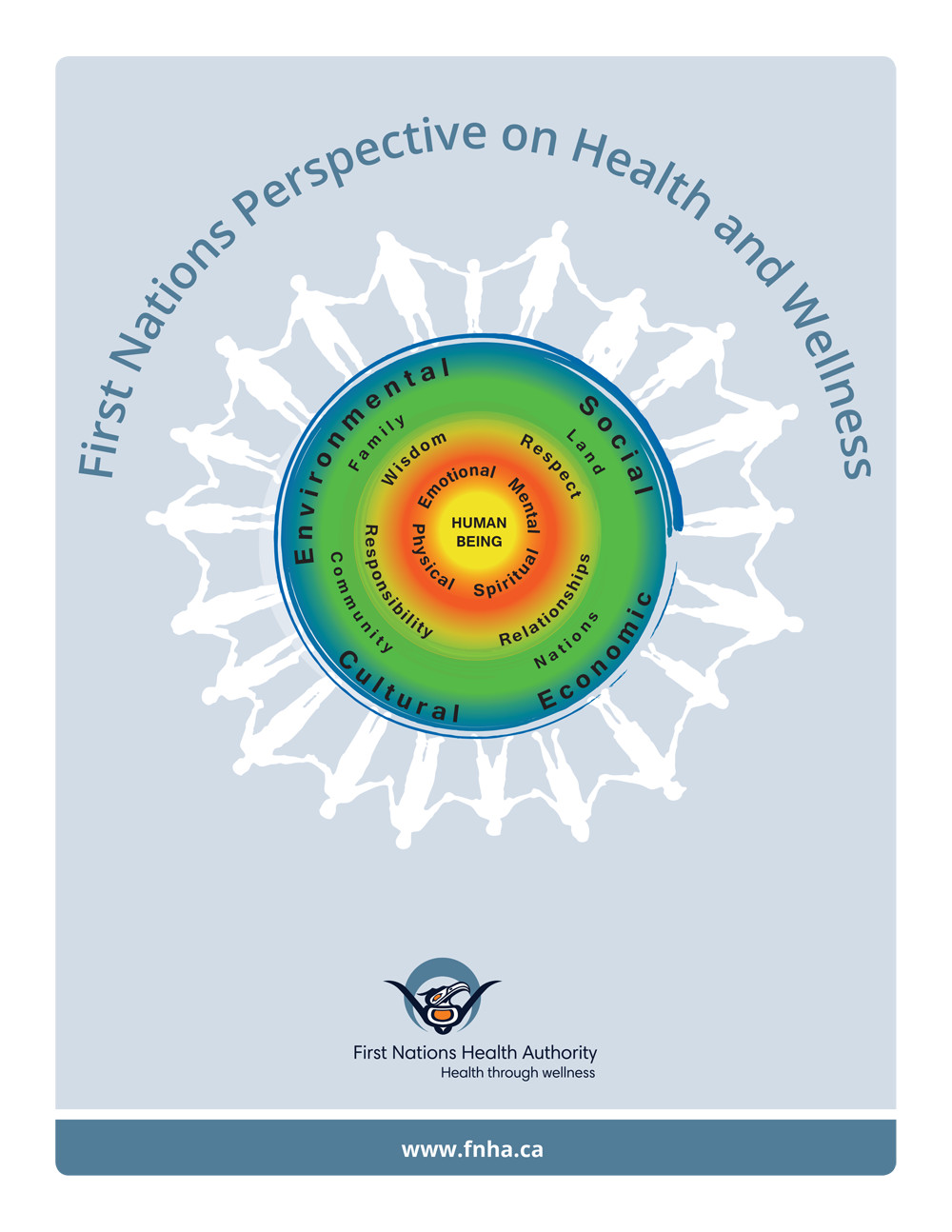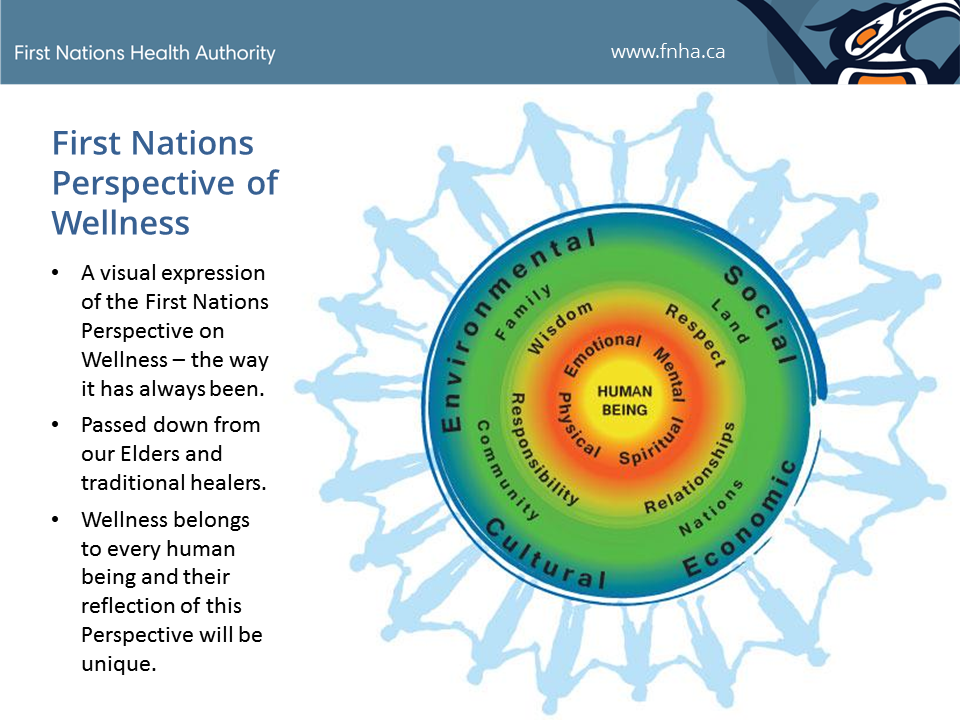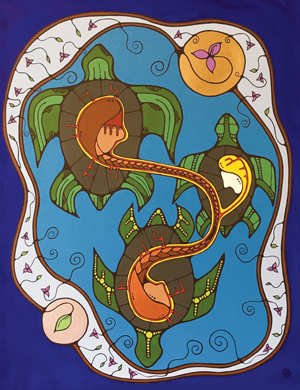Definition Of Health From An Indigenous Perspective
83 rated it as excellent or very good. For Aboriginal populations health is an overarching concept through the stages of life that comprise physical and mental wellbeing as well as spiritual and cultural cohesion.
 First Nations Perspective On Health And Wellness
First Nations Perspective On Health And Wellness
Healthy Self-Determining and Vibrant BC First Nations Children Families and Communities.

Definition of health from an indigenous perspective. A state of complete physical mental and social well-being not merely the absence of disease or infirmity. Health as excellent or very good 35 as good and 26 as fair or poor ABS 2016. 18 Moreover the understanding of the links between human and planetary health among Indigenous.
The recent emergence of storytelling or yarning as a research method in Australian Aboriginal and Torres Strait Island studies and other Indigenous peoples of the world is gaining momentum. Aboriginal health is not just the physical well being of an individual but is the social emotional and cultural well being of the whole community in which each individual is able to achieve their full potential thereby bringing about the total well being of their community. At stage of when many people quit smoking.
In 1946 in the preamble to its Constitution the WHO gave a global definition of health. Indigenous males were more likely to rate their health as excellent or very good than Indigenous females 43 compared with 37. Evidence exists that suggests there are positive physical health outcomes from living or working on country.
As a group support workers can provide a useful perspective of Indigenous health across each of the main socio- ecological levels. Indigenous Peoples concept of health and survival is both a collective and individual inter-generational continuum encompassing a holistic perspective incorporating four distinct shared dimensions of life. It is a holistic concept that includes physical social emotional cultural and spiritual wellbeing for both the individual and the community.
There is increasing recognition of Indigenous perspectives from various parts of the world in relation to storytelling research and its effects on practice. The First Nations Perspective on Health and Wellness aims to visually depict and describe the First Nations Health Authority Vision. Also connected to holistic medicine and its reverence of traditional knowledge some scholars in the 1980s underscored that the idea that human health and planetary health are the same thing or to harm the Earth is to harm the self isnt a new concept.
Regional Aboriginal Cancer Lead Dr. In light of prior research the current qualitative study was designed to better understand the factors influencing health behaviour within Indigenous. They included health workers because these support people were able to observe Aboriginal women during their pregnancy.
Despite many attempts to replace it no alternative definition has reached a wide level of consensus. Ganesharajah-2009-indigenous-health-wellbeing-importance-countrypdf pdf 35602 KB A key aspect to improving Indigenous wellbeing is exploring the relationship between land and wellbeing. The definition of health is not just a theoretical issue because it has many implications for practice policy and health services.
Indigenous populations are communities that live within or are attached to geographically distinct traditional habitats or ancestral territories and who identify themselves as being part of a distinct cultural group descended from groups present in the area before modern states were created and current borders defined. The traditional Indigenous perspective of health is holistic. For Aboriginal and Torres Strait Islander people good health is more than the absence of disease or illness.
At the time this definition was revolutionary because it took into account somatic psychological and social health. The first is that health is the absence of any disease or impairment. They generally maintain cultural and social identities and social economic cultural.
The current definition of health formulated by the WHO is no longer adequate for dealing with the new challenges in health care systems. Rather these ideas have been deeply embedded within Indigenous cultures for centuries. It aims to create shared understanding of an holistic.
For Aboriginal people this is seen in terms of the whole-life-view. The second is that health is a state that allows the individual to adequately cope with all demands of daily life implying also the absence of disease and impairment. Bernice Downey and former Aboriginal navigator Joanna Vautour describe their roles in the western healthcare system and.
Aboriginal health does not mean the physical wellbeing of an individual but refers to the social emotional and cultural wellbeing of the whole community. The third definition states that health is a state of balance an equilibrium that an individual has. This visual depiction of the Perspective on Health and Wellness is a tool for the FNHA and First Nations Communities.
It encompasses everything important in a persons life including land environment physical body community relationships and law. However it has also been argued that Indigenous health cannot improve whilst. The links between culture the wider natural environment human rights and health are rehearsed and a definition of health is offered.
Health care services should strive to achieve the state where every individual is able to achieve their full potential as. Aboriginal and Torres Strait Islander concept of health. The evolution of Indigenous primary health care services arose from mainstream health services being unable to adequately meet the needs of Indigenous communities and Indigenous peoples often being excluded and marginalised from mainstream health services.
Health is the social emotional and cultural wellbeing of the whole community and the concept is therefore linked to the sense of being Indigenous. Indigenous populations have poorer health outcomes compared to their non-Indigenous counterparts. Indigenous parents rated the health of their children aged 014 positively in 201415.
 Native Wisdom Native American Quotes Native American Spirituality Native American Wisdom
Native Wisdom Native American Quotes Native American Spirituality Native American Wisdom
 John Chivington Reamuswilson Com American Indians Oppression John
John Chivington Reamuswilson Com American Indians Oppression John
 Difference Between Aboriginal And Torres Strait Islanders Torres Strait Islander Early Childhood Education Curriculum Australian Curriculum
Difference Between Aboriginal And Torres Strait Islanders Torres Strait Islander Early Childhood Education Curriculum Australian Curriculum
 First Nations In Alberta First Nations First Peoples Map
First Nations In Alberta First Nations First Peoples Map
 Indigenous Health Equity Urban Indian Health Institute
Indigenous Health Equity Urban Indian Health Institute
 Satish Kumar On What Is A Sacred Place Satish Kumar Brings A Hindu Buddhist And Jain Perspective To The Sacred Places Poverty And Hunger Maternal Health
Satish Kumar On What Is A Sacred Place Satish Kumar Brings A Hindu Buddhist And Jain Perspective To The Sacred Places Poverty And Hunger Maternal Health
 Pin On Stand Up For Your Rights
Pin On Stand Up For Your Rights
 Image Result For Theory Of Generations Karl Mannheim Intercultural Communication Mannheim Intercultural
Image Result For Theory Of Generations Karl Mannheim Intercultural Communication Mannheim Intercultural
 Are Native Australians Having The Oldest Civilization In History Cambridge Alert American Indian History Aboriginal Ancient History
Are Native Australians Having The Oldest Civilization In History Cambridge Alert American Indian History Aboriginal Ancient History
 Spiritualities Of Nz Maori Spiritual Art Spirituality Indigenous Peoples
Spiritualities Of Nz Maori Spiritual Art Spirituality Indigenous Peoples
 First Nations Perspective On Health And Wellness
First Nations Perspective On Health And Wellness
 What Can Western Medicine Learn From Indigenous Healing Traditions Catie Canada S Source For Hiv And Hepatitis C Information
What Can Western Medicine Learn From Indigenous Healing Traditions Catie Canada S Source For Hiv And Hepatitis C Information
 Tuning In To Young Viewers Pdf Download Social Science False Book Media Studies
Tuning In To Young Viewers Pdf Download Social Science False Book Media Studies
 Pin By Joanne Mallory On First Nations First Nations National Daily Living
Pin By Joanne Mallory On First Nations First Nations National Daily Living
 Cover Returns Becoming Indigenous In The Twenty First Century From Harvard University Press The Twenties Harvard University Press This Or That Questions
Cover Returns Becoming Indigenous In The Twenty First Century From Harvard University Press The Twenties Harvard University Press This Or That Questions
 What Is Intergenerational Trauma And How Do You Heal From It Locallove
What Is Intergenerational Trauma And How Do You Heal From It Locallove
 Indigenous Astronomy On Twitter Astronomy Australian Curriculum Aboriginal Culture
Indigenous Astronomy On Twitter Astronomy Australian Curriculum Aboriginal Culture
 Reconciliation Week Early Childhood Quotes Childhood Quotes Reconciliation
Reconciliation Week Early Childhood Quotes Childhood Quotes Reconciliation
 This Image Is A Mind Map Of The Areas That Create Socialisation Under Each Key Area There Are Topics That Arise Within T Mind Map Socialisation Social Science
This Image Is A Mind Map Of The Areas That Create Socialisation Under Each Key Area There Are Topics That Arise Within T Mind Map Socialisation Social Science
Post a Comment for "Definition Of Health From An Indigenous Perspective"